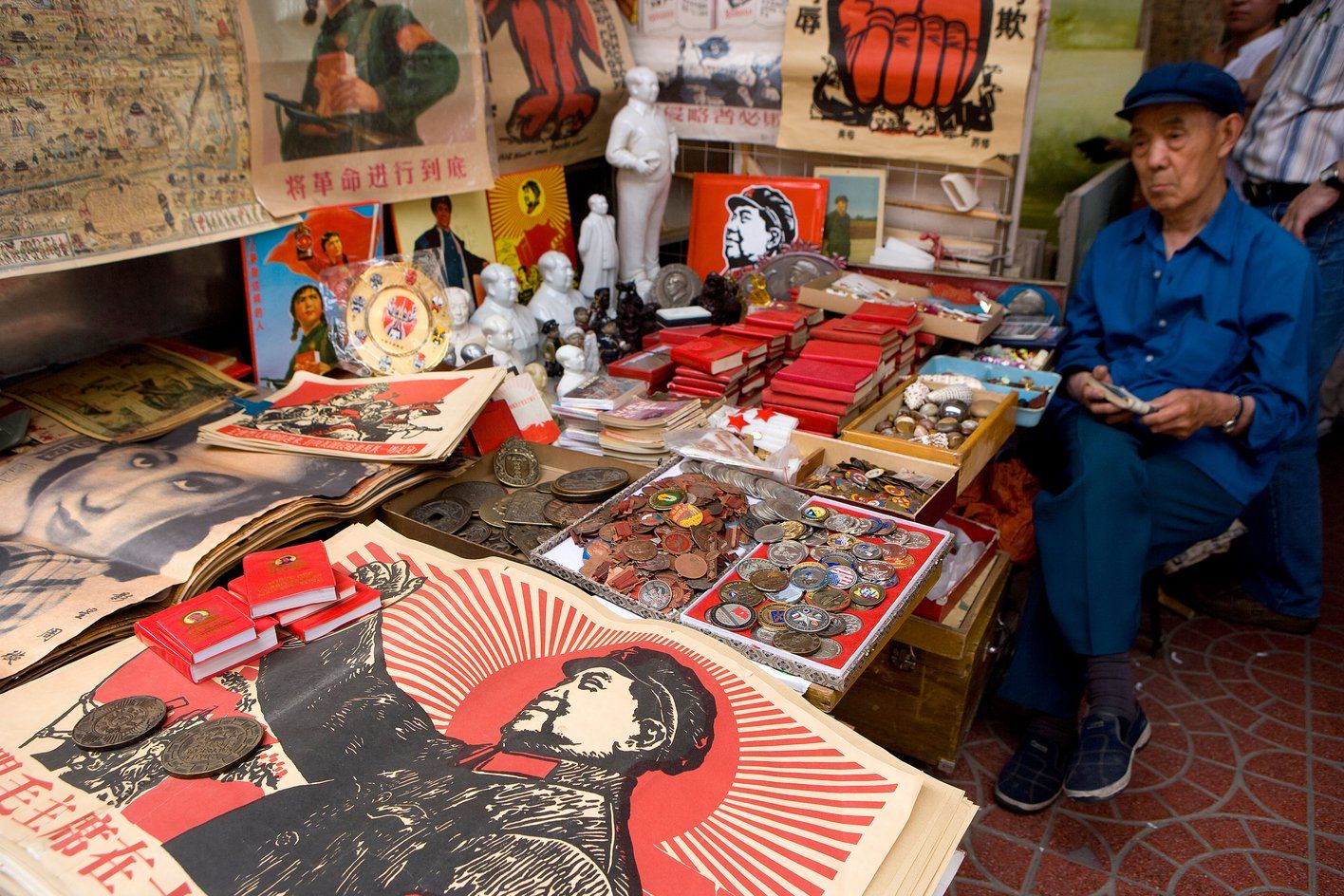China
Chinese Culture and the Red Line of Morality
Even the Soviet Union had its Bulgakovs and its Pasternaks, of course, and there is no doubt that art sometimes flourishes in an atmosphere of oppression.

Last week, members of China’s television, radio, and online entertainment sectors were made to attend a symposium in Beijing with the theme Love the Party, Love the Country, Advocate Morality and Art. They were instructed to abandon vulgarity, hedonism, the worship of money, and “extreme individualism.” These vague injunctions arrive amid China’s heaviest cultural crackdown in years. Film stars like Zhao Wei have been mysteriously memory-holed, their movies completely removed from streaming platforms, their credits erased from film information sites. “Once you touch the red line of law and morality,” warned state mouthpiece the People’s Daily, “you will reach the finish line of the road of performing arts.” If the exact nature of this “red line” remained unclear, another editorial put a finer point on the matter: Chinese films must be more socialist from now on.
American Idol-style TV shows have been banned; next on the list are karaoke songs that fail to “promote socialist core values.” These moves are part of an attempt to end the “worship [of] Western culture.” True socialism has no time for smut, and so the sale of sex toys has been banned during livestreams hosted on e-commerce websites. One week before the symposium, the Party zeroed in on the specific problem of effeminate male TV celebrities: “Resolutely put an end to sissy men and other abnormal esthetics,” broadcasters were told. Days later, building on recent video game restrictions for Chinese children, gaming companies Tencent and NetEase were ordered to cut content that encourages effeminacy.
All this machismo is beginning to attract admiring glances and approving noises from Westerners worried about their own culture’s alleged feminisation, but these lessons in morality are being delivered by the worst conceivable teacher. Lest we forget, this is a regime that packs ethnic minorities into concentration camps where the prettiest women are raped every day, sometimes with electric batons. This is a country where the founder of an orphanage for deprived children is arrested, tortured, and then sent to prison for 22 years. Bangri Rinpoche’s orphanage was declared an “illegal organisation” and the children he had saved were turned onto the street. In Communist China, civil society is always smothered in the crib. The moment we turn to such a regime for lessons on morality is the moment we lose our way completely.
The Party’s stern alternative to all that sex and pop and sissy chaos is “Chinese traditional culture, revolutionary culture, and advanced socialist culture.” Numbers two and three on the list indicate that Beijing understands culture about as well as it understands morality. George Orwell saw the problem clearly back in the pre-war years. As he observed in The Road to Wigan Pier, “Nearly everything describable as socialist literature is dull, tasteless, and bad. … Every writer of consequence and every book worth reading is on the other side. … Socialism has produced no literature worth having.”
This truth is borne out by the miserable state of China’s literary scene. When Anna Sun (assistant professor of sociology and Asian studies at Kenyon College) analysed the work of modern Chinese writers, she found that almost all of them had been infected by socialist language dating back to the Mao era—a clumsy jumble of communist jargon and Mao-ti (Maoist literary form). In fact, it’s not just the artists and intellectuals who speak this language—everyone does, from the diner in a restaurant who casually asks his friend to “Xiaomie [annihilate] the leftovers,” to the young mother who tells her little boy, as he struggles not to wet himself on the bus, “Jianchi! [Be resolute!]”
Originally fashioned to represent the authentic voice of the proletariat, Mao-ti is a language “repetitive, predictable, coarse, and mostly devoid of aesthetic value.” Sun argues that the most celebrated of today’s Chinese novelists actually owe everything to their translators. The language in which they were trained acts as a trap constricting thought, and as a result they can neither think nor write with the precision and truthfulness required of genuinely great novelists. Some have found that the only sure way to spring the trap is to abandon Chinese altogether, and write in English.
Even the Soviet Union had its Bulgakovs and its Pasternaks, of course, and there is no doubt that art sometimes flourishes in an atmosphere of oppression. But right from the very beginning, the CCP took the totalitarian impulse further than its predecessors—far enough that its natural supply of great literary voices was never allowed to develop. This was not the case in pre-revolutionary China. Sun cites with admiration Shen Congwen, Wang Zengqi, Lao She, Bing Xin, Qian Zhongshu, Fu Lei, Eileen Chang. In each of these cases the writer’s education occurred before Mao’s takeover, allowing them to develop a voice before they were exposed to the infection. Chang (widely considered the greatest short story writer of 20th-century China) even participated in re-education sessions once the communists were in charge, but it made no difference. Her writing still had too much complexity, too much depth, too much of her own voice. Incapable of descending to their crude level, she left for Hong Kong.
The incompatibility of classical Chinese with Mao-ti—of beauty with ugliness—shows the hopelessness of the Party’s dream to usher in a new culture that is at once “traditional” and “socialist.” These two cultural strains may have co-existed uneasily for decades in China (along with Western influence), but there can be no happy union of the two. They sit at opposite poles. Any emphasis on one of them will automatically undermine the other. It would be better to simply let go of the reins and allow Chinese culture to develop organically—something which has happened only once before.
While state propaganda paints the relatively open pre-communist period (1912–1949) as a time of chaos, societal weakness, and general regression, historian Frank Dikötter makes a convincing case in The Age of Openness: China Before Mao that those years really bore witness to a veritable golden age. Not only did China make political advancements; she enjoyed greater cultural diversity than at any point before or since. Religious movements long persecuted under the Qing were given their freedom. In the absence of both empire and socialism, Shanghai rose to become the Asian jazz Mecca; its numerous venues frequently played host to top musicians from the United States.

With the liberation of culture came the fast flourishing of individualism. Dikötter notes that “Women of all social backgrounds selected scarves, skirts, blouses, gowns, and corsets from a growing range of sartorial possibilities, using them in combinations which were often strikingly original: the use of the one-piece gown with a scarf and coat is but one example.” By 1934, when discussing new developments in public transport, the British traveller Peter Fleming was able to observe: “The running of a bus service, as compared with the running of a railway, is not only easier but offers more scope for individualism, and is therefore better suited to the Chinese character” [emphasis mine]. So much for the inherently collectivist nature of the Chinese. Just a few short years after the cultural shackles were removed, the natural human tendency towards individual self-expression had already asserted itself.
Then came the communist revolution, and the life was abruptly sucked out of China. Shanghai’s cafés and dance halls closed down; the Race Course at Nanking Road was transformed into a military barracks. Lipstick and makeup disappeared. Soon all of the men had crewcuts and all of the women wore their hair in short bobs. Everyone dressed in the same faded blue or grey cotton. And then in the 1960s, of course, Mao’s Great Proletarian Cultural Revolution saw the widespread demolition of statues and temples, the smashing of antiques, and the burning of books. Today’s ominous developments do not mean that China is about to experience a second Cultural Revolution, but the promise of an “advanced socialist culture” bodes ill.
At last week’s Beijing symposium, one film director delivered a sycophantic address in which he said, “It is our creators’ duty to do every work simply and unadornedly, and to pass positive energy silently to the audience.” This sentiment chimes with Stalin’s pithy proverb about writers being the engineers of the soul (a line echoed in recent years by Xi). And yet, the truth is that creators have a duty to their art and nothing else—not to their audience, not to “positive energy,” and least of all to some high-minded state-determined notion of the improvement of the people. Certainly art elevates, but not for reasons that we will ever be able to fathom.
As for the karaoke singalongs and American Idol copycat shows that sit at the other end of the spectrum, we might imagine that Chinese culture will suffer no great loss. But millions of people are about to have perfectly innocent pleasures removed from their lives, and this matters. In the small ways as well as the large, Xi Jinping continues to impose on a vibrant nation his narrow, pinched, joyless vision.






